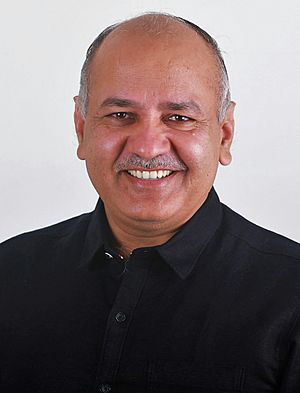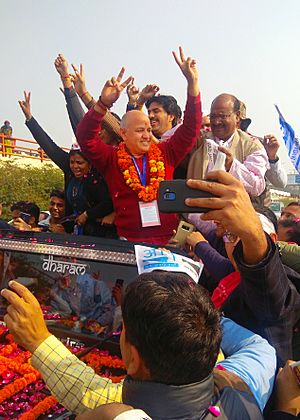Manish Sisodia facts for kids
Quick facts for kids
Manish Sisodia
|
|||||||||||
|---|---|---|---|---|---|---|---|---|---|---|---|

Official portrait, 2020
|
|||||||||||
| 1st Deputy Chief Minister of Delhi | |||||||||||
| In office 14 February 2015 – 28 February 2023 |
|||||||||||
| Lieutenant Governor |
|
||||||||||
| Chief Minister | Arvind Kejriwal | ||||||||||
| Preceded by | Position Established | ||||||||||
| Succeeded by | |||||||||||
|
|||||||||||
| Member of Delhi Legislative Assembly | |||||||||||
| In office 10 February 2015 – 8 February 2025 |
|||||||||||
| Preceded by | President's Rule | ||||||||||
| Succeeded by | Ravinder Singh Negi | ||||||||||
| Constituency | Patparganj | ||||||||||
| In office 8 December 2013 – 10 February 2014 |
|||||||||||
| Preceded by | Anil Kumar Choudhary | ||||||||||
| Succeeded by | President's Rule | ||||||||||
| Constituency | Patparganj | ||||||||||
| Personal details | |||||||||||
| Born | 5 January 1972 Hapur, Uttar Pradesh, India |
||||||||||
| Political party | Aam Aadmi Party | ||||||||||
| Spouse | Seema Sisodia | ||||||||||
| Children | 1 | ||||||||||
| Residence | AB-17, Mathura Road, East Delhi | ||||||||||
| Education | DJMC | ||||||||||
| Alma mater | Bharatiya Vidya Bhavan | ||||||||||
| Occupation | |||||||||||
Manish Sisodia (born 5 January 1972) is an Indian politician and former journalist. He served as the first Deputy Chief Minister of Delhi from 2015 to 2023. He was a representative for the Patparganj area in the Delhi Legislative Assembly. He held this position from 2015 to 2025, and also from 2013 to 2014.
Manish Sisodia is one of the people who helped start the Aam Aadmi Party (AAP). He is also a member of its National Executive Committee. He was a cabinet minister in the Government of Delhi from December 2013 to February 2014. After becoming Deputy Chief Minister, he continued to hold several important roles. One of his key roles was the Education Minister. He is known for making big changes and improvements to the public education system in Delhi. He resigned from his cabinet positions in February 2023.
Contents
Early Life and Career
Manish Sisodia was born on January 5, 1972, in Phagauta village. This village is in the Hapur district of Uttar Pradesh, India. He grew up in a Hindu Rajput family. His father was a teacher at a public school. Manish Sisodia went to the government school in his village.
He started his career as a journalist. He earned a diploma in journalism from Bharatiya Vidya Bhavan in 1993. Early in his career, he also worked as a radio jockey for an FM radio station. In 1996, he hosted programs like "Zero Hour" for All India Radio. From 1997 to 2005, he worked for Zee News. There, he was a reporter, news producer, and news reader.
Social Activism
Manish Sisodia worked with Arvind Kejriwal, who later became the Chief Minister of Delhi. They were both leaders of a non-profit group called Parivartan. This group helped citizens who had trouble dealing with the government.
After leaving journalism, Sisodia and Kejriwal started another non-profit called Kabir. This group organized public meetings where government officials and people could talk. Sisodia was also a key person in the group that wrote the first version of the Right to Information Act. This law helps people get information from the government.
Later, Sisodia was an important part of the Anna Hazare-led India Against Corruption movement in 2011. This movement wanted a new law called the Jan Lokpal bill. He helped write the first draft of this proposed law. He was also involved in protests related to this movement.
Political Journey
Manish Sisodia was one of the main people who started the Aam Aadmi Party (AAP). He became a member of the party's Political Affairs Committee.
In December 2013, he was elected as a Member of the Legislative Assembly in Delhi. He won against Nakul Bhardwaj from the Bharatiya Janata Party. Sisodia won by 11,476 votes in the Patparganj area.
In February 2015, the AAP won a huge victory in the Delhi Assembly election. Sisodia was again elected from Patparganj. He defeated Vinod Kumar Binny of the Bharatiya Janata Party by more than 28,761 votes. In the 2020 Delhi Legislative Assembly election, he won again. This time, he defeated Ravinder Singh Negi, a BJP candidate, by over 3,000 votes.
Cabinet Minister in Delhi
Manish Sisodia served as a cabinet minister in all three governments led by Arvind Kejriwal. During the Third Kejriwal Ministry, he was in charge of several departments for the Government of Delhi. These included:
- Finance
- Education
- Tourism
- PWD (Public Works Department)
- Labour
- Planning
- Land & Building
- Vigilance (checking for honesty)
- Services
- Art
- Culture
- Language
He resigned from his cabinet roles on February 28, 2023.
Achievements as Cabinet Minister
Education Reforms
When the AAP government came to power in Delhi, Sisodia decided to improve the public education system. One of his first decisions as Delhi's Finance Minister in 2015 was to double the money for public education. Since then, the Delhi government has spent a quarter of its total budget on education. This is the highest amount in India.
A clear sign of these changes is the improved school buildings. They now have modern classrooms with technology for teaching. Many schools also have football fields, hockey turfs, auditoriums, and science labs. Delhi also has School Management Committees (School Boards) led by parents. This helps schools be more responsible to their communities. The Delhi government has held many large Parent Teacher Meetings (PTMs). These meetings help teachers and parents talk about how to help students learn better.
Under Sisodia's leadership, many new things happened inside classrooms. Teachers received advanced training to help them focus on what students learn. The government started a program called Mission Buniyaad. This program helps improve basic learning skills for students. Sisodia also tried new types of lessons. These include the Happiness Curriculum, Entrepreneurship Mindset Curriculum, and Deshbhakti Curriculum. These lessons teach students important values and skills. They help students live happy, meaningful, and productive lives. These lessons are used in all government schools and some private schools in Delhi. They help students develop the right mindset to become responsible citizens.
Manish Sisodia also started a program for student entrepreneurs called “Business Blasters”. This program helps students think about creating jobs instead of just looking for them. Students get 2,000 rupees as starting money to set up their own businesses. This program involves learning by doing, like field projects and talking to real entrepreneurs. In its first year, 126 students reached the final round. They showed their businesses at the Business Blasters Expo in March 2022.
In 2018, he gave a main speech at the Harvard India Conference. He spoke about the government's changes in education and healthcare. In 2017, he shared the Delhi Education model at a global education conference in Moscow. Education experts from 70 countries were there.
In December 2021, Manish Sisodia presented the Mindset Curricula (Happiness, Entrepreneurship, and Deshbhakti) at the RewirEd Summit in Dubai. In May 2022, he spoke at the Education World Forum in London, UK. He shared how Delhi people's trust in government schools was brought back.
In 2021, he supported students who wanted to cancel the CBSE Board Exam for Class 10. This was because of the rising COVID-19 cases. In August 2022, his education policy was praised by The New York Times.
Sisodia has also written a book called 'Shiksha: My Experiments as an Education Minister'. This book tells the story of the education changes in Delhi.
Higher and Technical Education Reforms
Manish Sisodia also made changes in higher education. He helped create three new state universities. These are the Delhi Skill and Entrepreneurship University (DSEU) in 2020, Delhi Sports University (DSU) in 2021, and Delhi Teachers University in 2022. Also, the number of places in state universities has greatly increased. This allows more students to attend.
Funding for Delhi University Colleges
In 2020, there was a discussion about money at some Delhi University colleges. Sisodia said that four colleges were not using their funds correctly. These colleges were Deen Dayal Upadhyay (DDU) College, Keshav Mahavidyalaya, Bhagini Nivedita College, and Shaheed Sukhdev College of Business Studies.
The colleges said they needed more money to pay salaries and bills. Sisodia said some colleges had money saved in fixed deposits. He claimed they were refusing to pay staff even with enough funds. The colleges said these savings were from "Student's Society Fund." This money is for student welfare and cannot be used for salaries. This discussion showed the challenges colleges face with money and rules. Later, the Delhi Government provided funds for employee salaries.
Economic Reforms
During Sisodia's time as Finance Minister in Delhi, the government's budget grew a lot. It more than doubled in seven years. This was from ₹30,940 crores in 2014–15 to ₹75,800 crores in 2022–23. This increase happened because more people paid taxes.
Sisodia also started an "Outcome Budget." This budget connects public spending to what is actually achieved. It tracks over 2,200 outputs and 1,549 outcomes across 39 departments. This is seen as a big step in making public spending more responsible. He is the only finance minister in any state to have presented eight budgets in a row.
On March 26, 2022, he presented a budget of ₹75,800 crore in the Delhi Assembly. AAP leaders hoped this budget would create jobs for 20 lakh (2 million) people in Delhi in the next five years.
Political and Social Ideas
In his budget speech for 2016–17, Sisodia said that the government's goal is not just to spend money. It is to make sure every rupee spent helps people's lives. He has said that elections should be about education and health, not about caste or religion.
At the World Education Conference in Moscow in 2018, Sisodia said that building a good education system is a real contribution to society. He believes education should prepare students to deal with today's problems. These include pollution, and unfair treatment. In 2019, he said students should be able to create jobs, not just look for them. He also believes India needs an education system that gives high-quality learning to all students.
Awards and Recognition
- 2016: Listed among the 100 most influential Indians by The Indian Express.
- 2017: Awarded the "Finest Education Minister" award by The Indian Express.
- 2019: Received the Champions of Change Award for his great work in education in Delhi.
- 2021: Honored with the Mahatma award for promoting excellence in education. This is a global award for social impact leaders.
Images for kids
 | Stephanie Wilson |
 | Charles Bolden |
 | Ronald McNair |
 | Frederick D. Gregory |




